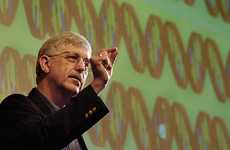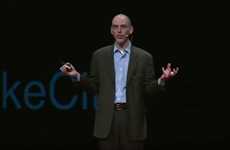
Need Inspiration?
Get inspired by 4,000+ keynote speaker videos & our founder, a top keynote speaker on innovation.
Lisa Genova's Alzheimer's Talk Offers Hope for Senior Health
Joey Haar — May 20, 2017 — Keynote Trends
References: youtube
As Lisa Genova's Alzheimer's talk lays out, the statistics behind the neurodegenerative disease aren't very reassuring. A very high percentage of elderly people suffer from the brain-ravaging ailment, and those figures only rise as people get older. As Genova puts it, it seems that the ultimate destiny of the human brain is to suffer Alzheimer's. While a cure for the disease may still be a long way away, though, Genova believes there are preventative treatments that could effectively eradicate it.
Brains function through the firing of neurons across spaces called synapses. In normal brain function, neurons release a byproduct called amyloid protein, which special cells routinely clear away. Scientists believe that Alzheimer's occurs when either the neurons produce too much amyloid or the cells can't clear it away as well, leading to buildups called plaques.
Amyloid buildup starts early -- far earlier than even the vaguest symptoms of Alzheimer's. The problem is that, by the time people begin to show these onset symptoms (small things like forgetting where one's keys are only to find them in an odd spot like the fridge,) it is too late to treat the Amyloid buildup. The plaque has reached a tipping point that scientists don't yet know how to reverse.
Genova posits that getting good sleep, keeping cardiovascularly healthy, and learning new things can keep these amyloid proteins in check before that point of no return.
Brains function through the firing of neurons across spaces called synapses. In normal brain function, neurons release a byproduct called amyloid protein, which special cells routinely clear away. Scientists believe that Alzheimer's occurs when either the neurons produce too much amyloid or the cells can't clear it away as well, leading to buildups called plaques.
Amyloid buildup starts early -- far earlier than even the vaguest symptoms of Alzheimer's. The problem is that, by the time people begin to show these onset symptoms (small things like forgetting where one's keys are only to find them in an odd spot like the fridge,) it is too late to treat the Amyloid buildup. The plaque has reached a tipping point that scientists don't yet know how to reverse.
Genova posits that getting good sleep, keeping cardiovascularly healthy, and learning new things can keep these amyloid proteins in check before that point of no return.
1.8
Score
Popularity
Activity
Freshness
















